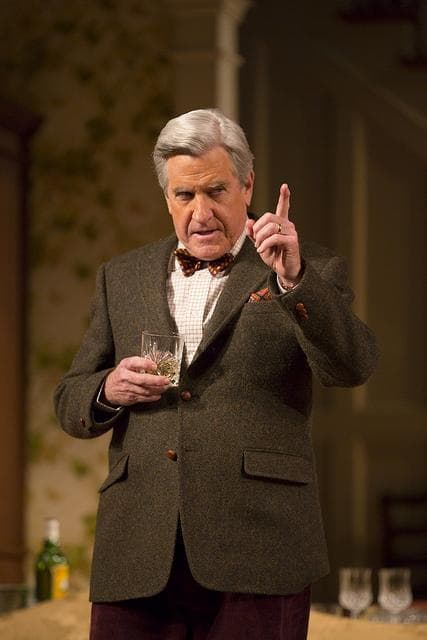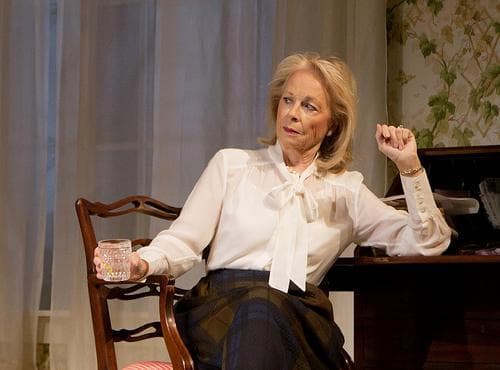Advertisement
Gurney And Huntington Make Merry At 'Cocktail Hour'
BOSTON — When the father in A.R. Gurney’s “The Cocktail Hour” says to his playwright son, "I'd want to prove to those critics we are worth writing about,” you sense that this is part of Gurney’s raison d’etre as well — to show that the rich WASPs of his upbringing have lives as play-worthy as the Willy Lomans, James Tyrones, Amanda Wingfields and Ma Raineys of the theater world.
His 1988 play doesn’t really reach that level, though the entertaining production at the Huntington Theatre Company (through Dec. 15) shows that if Gurney isn’t in Arthur Miller’s company he is at least in Neil Simon’s. That isn’t damning with faint praise — Simon is a better writer than he’s often given credit for.
But like Simon, Gurney is more witty observer than tribal dissector, which nonetheless goes a long way at the Huntington. This could be the dictionary definition of a meta play as a Gurney-like playwright revisits a Gurney-like upper-echelon Buffalo family with what seems to be a Gurney-like play that threatens to blow the whistle on their seemingly perfect lives.

Well, not quite perfect. They can’t find decent servants; Jigger, the favorite son, doesn’t get home anymore; and John, the playwright, has a giant chip on his shoulder. Not “Long Day’s Journey Into Night,” but it doesn’t try to be.
What, then, does it try to be? Gurney has said that he wanted to upend the comedy of manners, but it seems to fit right in with that genre. While there are obvious flaws, and I do mean obvious, in this family, they are an affable bunch. I wouldn’t mind having cocktail hour with folks like these — signal the work day is done with a toot, commiserate about the market and our favorite sports teams, argue politics.
John, the playwright, though, has blown this town. These Buffalo Brahmins, if that’s not a contradiction in terms, need to be shaken, not stirred. They hide everything. Their public personas are fake. Freud would have a field day with any or all of them.
And Gurney does, too, at least in terms of letting their banter define them. The father says about “The Cocktail Hour” — “They'll come expecting T.S. Eliot [“The Cocktail Party”], and they'll get John. Either way, they'll want their money back.”
The Huntington and director Maria Aitken do terrific work behind Gurney. Allen Moyer's set is just right — elegant and tasteful with its sturdy sideboards, floral wallpaper, vases and chandeliers that would pay for a good house in the burbs.

The parents are superb. Richard Poe and Maureen Anderman seem like they were born to play these parts — he blustery, she wry; he proud of his belief in God and country, she apolitical if not agnostic; both believers in civility being a virtue, incivility a sin. If Poe could bottle his glower, body language and perfect WASP diction he'd be a very rich man. Ditto Anderman with her bemused though hardly indifferent way of looking at the world. Pamela J. Gray (a favorite of former Huntington artistic director Nicholas Martin) is also excellent as Nina, their daughter, who knows that something is missing from their “perfect” lives, but doesn’t know what’s making her so miserable.
John aims to find that out, but alas he’s written so thinly and James Waterston plays him with such a whine that you wish he’d just shut up and let them hoist themselves on their own closed-down petards. When he starts in on his analysis on how his acting was a way of parading his penis around the house it’s hard not to side with the parents.
Time and again you wish that Gurney/John had just told it to the shrink and either found something more dramatic or been content to be a WASP comedian. When his mother reveals the source of his problem there’s no dramatic oomph, even if it’s a perfectly plausible explanation.
Still, the play and production make for a festive night. It doesn’t ask much of the audience except to sit back and be entertained. These are, in the end, people worthy of our attention, respect, and laughter even if their flaws shouldn’t be swept under the rug. Maybe that’s all that Gurney was trying to say in the first place.
Here's Huntington artistic director Peter DuBois on Gurney:
This program aired on November 22, 2013. The audio for this program is not available.

